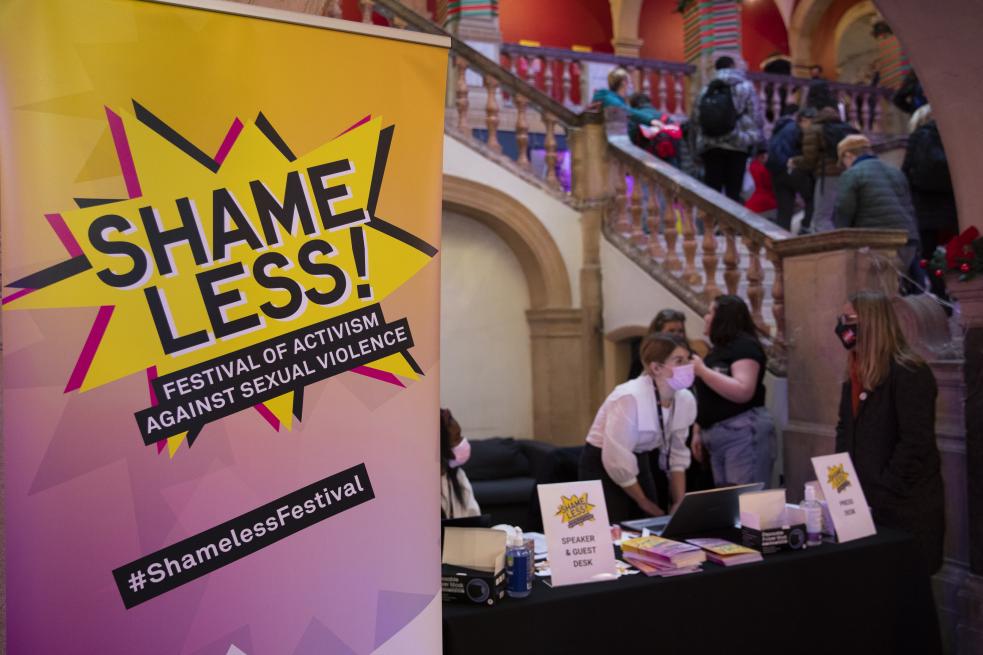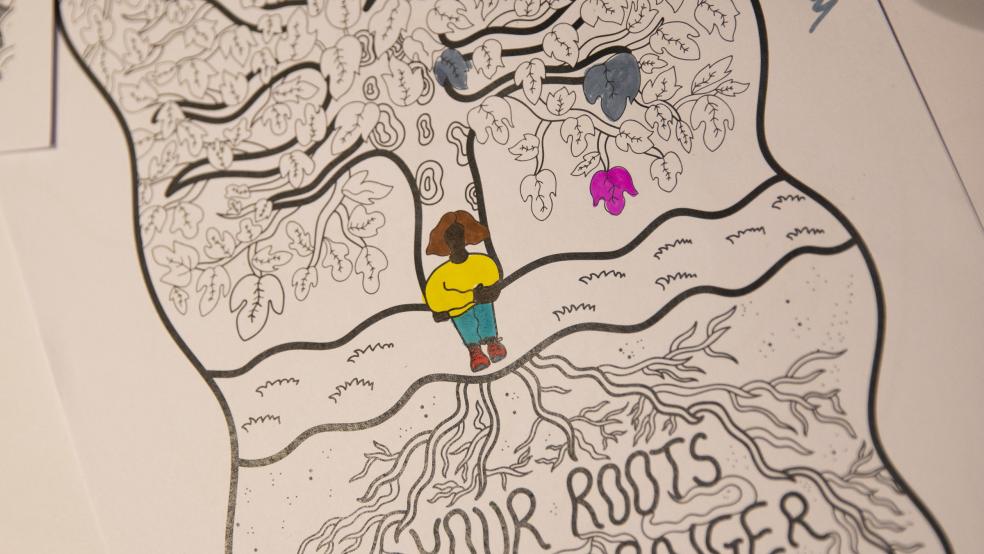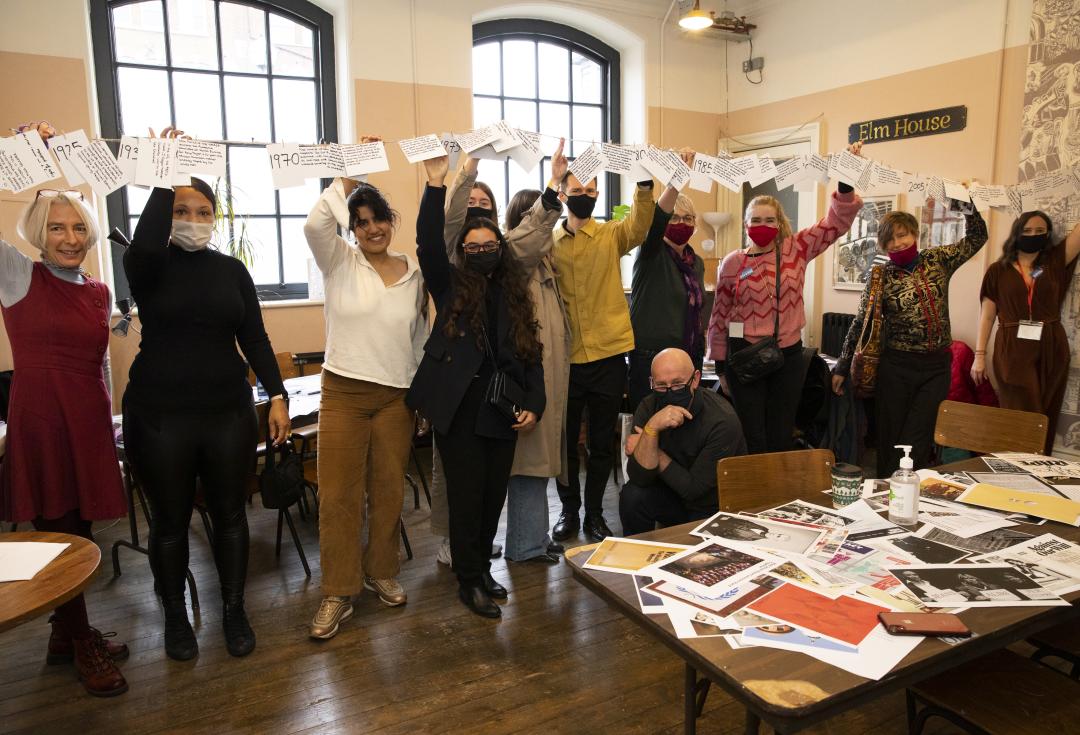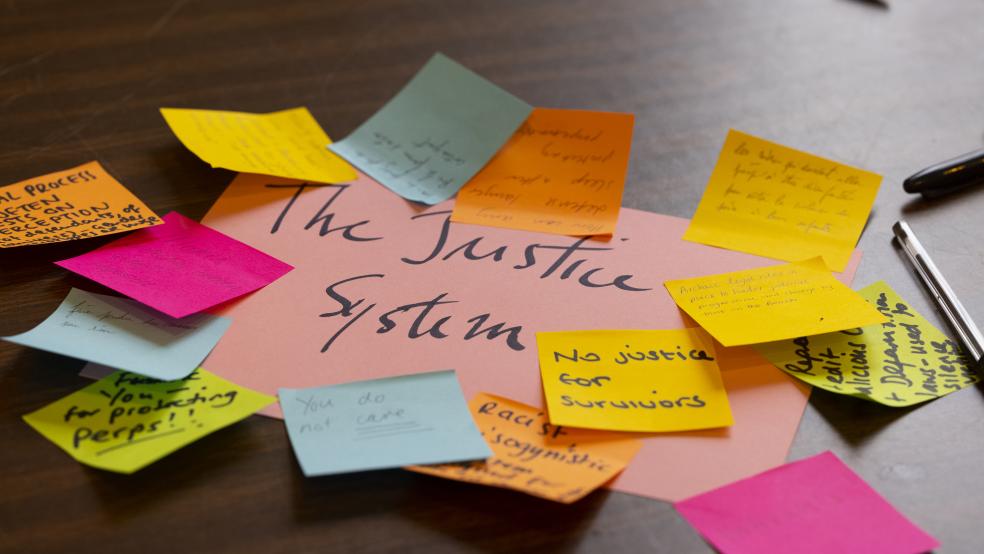Shameless! Festival of Activism Against Sexual Violence
Using activism, art, and academic research to challenge societal attitudes to sexual violence, and inspire action.
A case study from Dr Rhea Sookdeosingh, Honorary Research Fellow at the School of Historical Studies, Birkbeck, University of London and Sabeena Akhtar, Head of Projects and Programmes at The WOW Foundation.
[Content and Trigger Warning: This case study contains information that refers to sexual violence. If you need confidential emotional support, please call the 24/7 National Rape Crisis Helpline on 0808 500 222.]

Shameless! Festivals of Activism Against Sexual Violence was a Wellcome Trust-funded public engagement initiative co-created by The Sexual Harms and Medical Encounters (SHaME) Project at Birkbeck, University of London, and gender equity charity - The WOW Foundation, which used activism, art, and academic research to challenge harmful stereotypes about sexual violence through a one-day festival format.
The Festival format, developed by WOW and SHaME inspired action, honoured the multi-faceted work of survivor-activists, and was designed to be a joyful, invigorating experience for festival-goers and speakers alike, despite the gravity of the topic.
The first Shameless! Festival was held in London in 2021, followed by a second festival, Ecoar!, In Rio de Janeiro in 2022. At a stall at NCCPE's Engage conference in 2023, we shared information about how the festivals were co-produced in an inclusive and ethical way, which was aimed at empowering audiences, contributors, and colleagues.
It is also important to note that the Engage stall itself did not discuss sexual violence, but rather focused on details about the festival model and the collaboration that co-produced it.
Purpose
The purpose of the Shameless! Festivals was to convene a space and bring together people who were working on, and invested in, the topic of sexual violence, and the general public,- especially those who may not ordinarily cross paths with one another - to help confront and change attitudes to sexual violence.
The co-production team (SHaME and WOW) recognised that often people are navigating the aftermaths of sexual violence and trauma in isolated and individualised ways. The festival sought to create a space where people could truly feel that others present were also working towards the same goal - whether in a professional or personal capacity: to challenge stigma surrounding sexual violence and collectively imagine a rape-free world.
The festivals brought together academics, activists, artists, survivors, medical practitioners, and public audiences to share space and converse. Through talks, performances, creative workshops, how-to clinics, wellness spaces, support services, and counsellors provided on site, a level of accessibility was achieved that drew all these people in. Further, the festival format- as opposed to a conference or academic space- was used to co-create a sense of community and collective joy and lightness, to encourage people to engage and to ensure that everyone felt welcome to attend.
Background
Tarana Burke, ‘me too’ founding activist, was an inspiration for this project in the context of her activism against sexual violence and her commitment to community organising. SHaME was an interdisciplinary research hub sitting at the intersection of medicine, psychiatry and sexual violence. The WOW Foundation is a global movement and gender equity charity that produce WOW - Women of the World Festivals - and events in more than 45 locations, celebrating women, girls and non-binary people across the world and tackling the issues they face.
CEO and Founder of WOW, Jude Kelly, and SHaME’s Principal Investigator, historian Joanna Bourke, recognised that both SHaME and WOW were deeply invested in mapping the way to a rape-free world. Bourke and Kelly then sparked a conversation between teams at both organisations about how to formalise a partnership and build a scalable festival model focused on ‘activism against sexual violence.’ Dr. Rhea Sookdeosingh, Public Engagement and Events Lead at SHaME, began working with senior WOW team members Sabeena Akhtar, Shereen Perera and the wider WOW team to take this idea from seed to proposal. Funding from the Wellcome Trust supported the team in bringing their idea to life.
Evaluation
The delivery team used surveys to gain audience feedback on the day and afterwards, whilst WOW had additional evaluation based on a postcard model available on stands. Further, feedback was obtained from contributors who ran sessions, via surveys and semi-structured interviews. And lastly, the wider team of partners engaged in a formal debrief to conduct evaluation. The Shameless! Festival webpage has numerous blog posts which capture some glimpses of the festival’s impact.


Survivors are not a monolith; they make sense of their experience in different ways. Still, all their stories matter. This is one of the reasons why the festival model worked, because it brought a diverse range of voices together.
Legacy
The Shameless! Festival has a three-pronged legacy:
- A festival model which is scalable, transferrable, and can be adapted to different geographical and political contexts. This provides a tried-and-tested framework for such festivals to be run locally and globally. Notably, a second Shameless! Festival - called Ecoar!- was held in Rio de Janeiro, Brazil, in 2022 led by women from the Marè Favela, Rio.
- A major accomplishment of the festival was bringing together people working on sexual violence from different backgrounds - activism and advocacy, law, medicine, academia, the arts - who never would have met, and provided the opportunity to meet, share ideas, and chart new paths forward. As a result, the festival started an urgent conversation about sexual violence that the delivery team and attendees can take forward within their own collaborations. Peer-to-peer support groups were also set up by some people who met one another at the festival.
- Video and audio content produced from the festival is available online; these can be used individually or collectively to prompt conversations, and as a teaching resource. Additionally, a Shameless! Festival Toolkit has also been published to support people towards creating their own initiatives on how to have difficult but necessary conversations.
Resources

Shameless! Festivals were a Wellcome Trust-funded initiative, co-produced by The SHaME Project at Birkbeck, University of London, and The WOW Foundation who produce WOW - Women of the World Festivals.
Additionally, the festival itself included survivors, high profile speakers, performances by artists, poets, and musicians, and researchers and medical professionals.